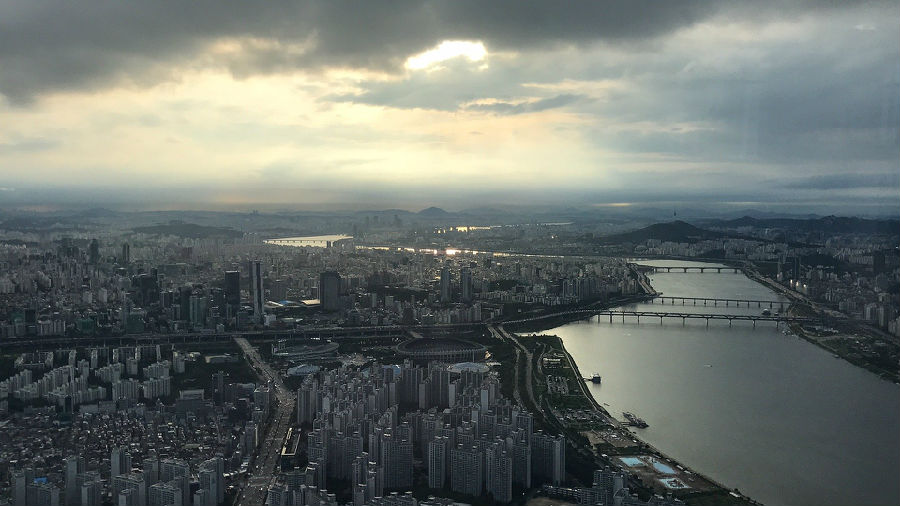Judging from the chatter on the streets of Gangnam, it is a bad time to buy property in the South Korean capital.
從江南街道上的嘈雜聲可以判斷出,現(xiàn)在不是在韓國首都置辦房產(chǎn)的好時機(jī)。
"It's been a nightmare looking for an apartment," says Lee, a 30-year-old who lives in a rented studio in the glitzy district in southern Seoul.
“找公寓簡直是一場噩夢”,30歲的Lee說到,Lee住在首爾南部繁華地區(qū)一間租來的單間里。
"I think about what to buy and where and a month later the price has gone up by 20%."
“我在考慮買什么,去哪里買,一個月后房價就上漲了20%。”
Although he has a good job at a big company and is planning to buy with his girlfriend, he worries they'll have to keep renting for now.
雖然他在一家大公司有一份不錯的工作,并計劃和女朋友一起買房,但他擔(dān)心,現(xiàn)在他們不得不繼續(xù)租房。
"The government says they want to fight the rich, but actually they're hitting the middle class."
”政府表示他們想要打擊富人,但其實他們正在打擊中產(chǎn)階級。”
In recent months such complaints have become more common.
近幾個月,這樣的抱怨越來越普遍。
Greater Seoul is home to half of South Korea's population and to the vast majority of attractive jobs, schools and entertainment options.
韓國一半人口居住在首爾,絕大多數(shù)有吸引力的工作、好學(xué)校和娛樂場所也都在這里。
Few people with any ambition can afford not to move there. But affording the move is hard.
有野心的人都想搬去那里,但承擔(dān)這一行動是困難的。
Residential property prices in the capital have risen by around 40% over the past three years, according to official statistics;
根據(jù)官方數(shù)據(jù),在過去三年,首都房屋價格上漲約40%,

in that time, the prices of flats have gone up by 52%, suggests analysis by KB Kookmin, a bank.
韓國國民銀行分析顯示,那時,公寓價格上漲了52%。
The rises have been fuelled in large part by demand for scarce high-quality flats in popular districts such as Gangnam.
房價上漲在很大程度上是由對江南等熱門地區(qū)稀缺優(yōu)質(zhì)公寓的需求推動的。
The government, spying a speculative bubble, has introduced around two dozen measures to cool the market over the past three years.
監(jiān)控投機(jī)泡沫的政府在過去三年里,推出了大約24項措施給該市場降溫。
In December it banned mortgages on properties worth more than 1.5bn won (around $1.3m), roughly the price of a mid-size flat in Gangnam.
在12月,韓國政府禁止對價值超過15億韓元(約合130萬美元)的房產(chǎn)發(fā)放抵押貸款,這個價格相當(dāng)于江南區(qū)一套中型公寓的價格。
It has also lowered the maximum loan-to-value ratio for flats worth more than 900m won from 40% to 20%.
其還將價值超過9億韓元的公寓的最高貸款率從40%降低到20%。
Last month it announced plans to increase property taxes for expensive homes and owners of multiple properties,
上個月,其宣布計劃提高對昂貴住宅和多套房產(chǎn)擁有者的房產(chǎn)稅,
as well as capital-gains levies on short-term sales. The overall effect, though, has been muddled and counterproductive.
以及針對短期出售的資本利得稅。雖然整體效果混亂且適得其反。
Young people such as Mr Lee, who are keen to get on the property ladder,
像Lee先生這樣熱衷登上房產(chǎn)階梯的年輕人
are particularly disgruntled by politicians' failure to make good on their promises to make housing affordable.
對政客沒能兌現(xiàn)‘人人能夠買得起房’的承諾尤為不滿。
In part the problem is that the government's efforts to cool the market have been offset by monetary easing by the central bank.
部分問題在于,政府為市場降溫的努力被央行的貨幣寬松政策所抵消。
In order to cushion the economic fallout from covid-19, the Bank of Korea has cut interest rates,
為了緩解新冠疫情對經(jīng)濟(jì)的影響,韓國銀行下調(diào)了利率,
encouraging some South Koreans to pile into property. Meanwhile, the tax proposals have angered existing investors, and are likely to restrict supply.
鼓勵了一些韓國人蜂擁進(jìn)入房地產(chǎn)行業(yè)。與此同時,稅收提議惹怒了現(xiàn)存投資者,且可能會限制供應(yīng)。
Parallel efforts to alleviate the shortage of high-quality housing by building more of it have been slow to get off the ground.
同時,通過建造更多住房緩解高質(zhì)量住房短缺,雙管齊下但進(jìn)展緩慢。
Prices, therefore, have continued to rise.
因此,價格繼續(xù)走高。
譯文由可可原創(chuàng),僅供學(xué)習(xí)交流使用,未經(jīng)許可請勿轉(zhuǎn)載。












